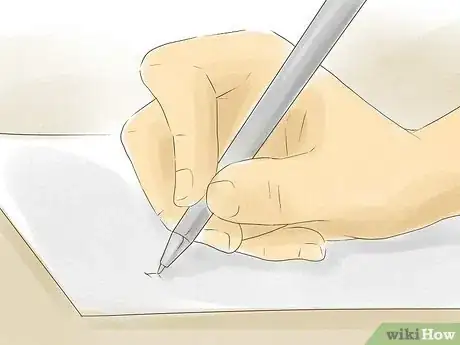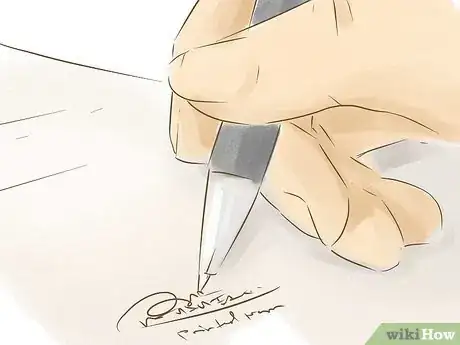This article was written by Jennifer Mueller, JD. Jennifer Mueller is an in-house legal expert at wikiHow. Jennifer reviews, fact-checks, and evaluates wikiHow's legal content to ensure thoroughness and accuracy. She received her JD from Indiana University Maurer School of Law in 2006.
There are 9 references cited in this article, which can be found at the bottom of the page.
This article has been viewed 16,148 times.
When you're writing your will, one of your most important tasks is to choose an executor. This person will be in charge of distributing your assets according to your will after you die. Apart from being someone you trust, your executor must be prepared for a job that could take months to complete. Depending on the size of your estate and the types of assets you have, your executor also may need particular financial or legal expertise.[1]
Steps
Evaluating Candidates
-
1Assess your estate's needs. Before you talk to possible executors, you should have a good understanding of the assets you have and rather any of them require specific expertise to distribute.
- Keep in mind that wills are not "one size fits all" documents. If you have particularly detailed final instructions, you want to make sure the executor you choose understands them and is capable of carrying them out.
- If you own a business, your executor should understand the work done there and aspects that may continue after your death.[2]
-
2Review your state's legal requirements. As a basic matter, executors generally must be a U.S. citizen over the age of 18 who has not been convicted of a felony.
- Some states also require your executor to be a resident of the state where you live or where the bulk of your property is located.
- In other states, out-of-state executors are only allowed if they are close relatives of the deceased, if they appoint an in-state representative, or if they post a surety bond.[3]
Advertisement -
3Talk to friends and family members. You should begin your search for an executor with those closest to you, since you likely trust them the most and they will have a greater commitment to you.
- Since family dynamics can be important when you're discussing end-of-life issues and the distribution of your assets, make sure close relatives feel they have a say in your decision – particularly if they will be beneficiaries of your estate.[4]
- If you have more than one child and only intend to name one of them as your executor, it's important to talk to all of them and make sure they understand why you've chosen the child that you have and how they can all work together to ensure an efficient administration of your estate.
- It can help in this situation if you have concrete reasons for your preference. For example, if your daughter is in law school, you may tell your other children you're choosing her because she has more education and understanding about court processes. Similarly, your son who is an accountant may be better able to deal with the financial and tax issues involved with inventorying and distributing the estate.
-
4Interview potential candidates. Once you have a few possibilities in mind, interview each of them to make sure they understand the duties of an executive and are prepared to carry them out.
- Talking to candidates beforehand ensures that each understands and is willing to accept the responsibilities of executor. Otherwise you run the risk that your named executor will decline the appointment, causing delay and uncertainty in the distribution of your estate.[5]
- Make sure your potential executors understand that they must be able to file the will with the court and petition for it to be entered into probate. They also must be capable of choosing professionals such as lawyers or accountants to assist with their duties if need be.[6]
- Executors also are responsible for creating a full inventory of the assets of the estate, including financial accounts, real property, and personal property. They then must make an accounting of all the debts and claims against the estate and pay them efficiently according to the priorities set forth in your state's probate law.[7]
- The executor you choose must be organized and have attention to detail, but also must be capable of communicating with your estate's beneficiaries and handling any conflicts that may arise. These duties may last for months or even years, depending on the size and complexity of your estate.[8]
- For a small estate, it's common to appoint your spouse or an adult child as your executor, since they typically have a personal interest in moving the estate through probate smoothly.[9]
- However, keep in mind that a close relative is likely to be grieving and may lack the emotional fortitude necessary to handle the business of wrapping up your estate. In addition to professional knowledge and expertise, you also should evaluate your candidates' abilities to compartmentalize or set aside their emotions to deal with the tasks before them.[10]
- Compare your candidates and analyze their relative strengths and weaknesses before you make your final decision. Beyond the legal eligibility requirements, you want an executor who has at least some financial or legal experience, and who is organized, reliable, and trustworthy.
- Avoid choosing someone simply because you have a close relationship with him or her. Choosing someone who is capable of doing the job is far more important than your emotional connection to that person.[11]
-
5Consider hiring a professional. In some situations, particularly if your estate is rather complex, you might benefit from using an attorney or professional firm rather than someone you know.
- A professional who doesn't stand to gain anything from your will can help avoid conflicts if you have several beneficiaries who don't get along and you anticipate trouble between them.[12]
- Using an attorney or financial planner also provides you with the assurance that your estate will be managed correctly and distributed according to the letter of the law.
- Using an institutional executor such as a bank can be beneficial for large estates, since additional personnel can be assigned as necessary.
- However, keep in mind that a disinterested professional may not be as effective as a close family member in terms of understanding your needs and intent.
-
6Notify your friends and family members of your choice. After you've decided who you want to name as your executor, make sure everyone with whom you discussed the matter knows who you've chosen.
- Particularly if you've decided to go with an outside professional, you should let your spouse, children, or other close family members know that they won't have the responsibility of distributing your assets.[13]
Naming More than One Executor
-
1Determine if distribution of your assets requires particular expertise. The job of executor may be too much for one person to handle, considering the size of your estate and the variety of assets you have.
- The executor role can be a time-consuming and difficult job, and you may decide you'd rather have those responsibilities spread among two or more people to lessen the impact.[14]
- Keep in mind that even if you grant your executor the power to hire professionals such as lawyers or accountants to assist him or her, having a professional as a co-executor could save the estate considerable money in professional fees.[15]
- A large estate can take years to distribute and may require some difficult choices with which members of your family disagree. Having more than one executor can alleviate some of the pressure of those decisions.[16]
- However, keep in mind there are drawbacks to naming co-executors. Typically, they must make all decisions unanimously and both sign any property deeds or financial transactions.[17]
-
2Talk to the person you've chosen. If you decide to name more than one executor, it's important that the two of them get along well.[18]
- While most estates don't require executors to have extensive legal expertise to fulfill their roles, your executor may feel more comfortable working with a professional.[19]
- At a minimum, the person you've chosen as your executor needs to know where your important financial documents and other information are kept, and how to access your accounts.[20]
- If the person you've chosen lives a significant distance away from you, or spends significant time at work, he or she may want a co-executor to deal with the daily basics of checking mail and property maintenance as well as any required court appearances.[21]
- You may also want to have co-executors to deal with a fractured or contentious family. Communication skills are important for an executor, but if you've chosen an executor who doesn't get along with particular members of your family, you may want to choose a co-executor who can work better with them.[22]
-
3Consider additional back-ups or alternates. Even if you only have one named executor, naming an additional back-up protects you in case something happens to that person and he or she is unable to fulfill the duties of executor.
- You should choose at least one back-up in case your first choice dies before you or is incapacitated and unable to serve when the time comes.[23]
- You also should keep in mind that even if the person you've chosen is able to fulfill the role, he or she may decline the responsibility when it comes time for various reasons. If this happens and you haven't identified an alternate, the probate court will appoint someone who may not be to your liking.[24]
- Even if you've chosen individuals such as family members to be your executors, you might consider listing a professional firm such as a bank or an accounting firm as a back-up, so you know an executor of your choosing ultimately will be available, even if it's not your first choice.[25]
Updating Your Will
-
1Redraft your will. Drafting a new will with your executor appointment clause can avoid delay because all necessary information is included in the same document.[26]
- Although you can always amend your old will by making a codicil, the codicil has the same signature and verification process as the original will, so it won't really save you much time or effort.[27]
- Include full legal names and contact information for each person you've named as executor. Doing so avoids the delay caused by the probate court having to hunt down the person you've named.
-
2Include a list of powers granted. While your state law typically grants executors certain powers, it's a good idea to specifically delineate the powers you want your executor to have.[28]
- Keep in mind that some states restrict the ability of executors to buy, sell, or mortgage real estate, so state specifically in your will if you want your executor to have this power.[29]
- On the other hand, if you have any property that you don't want to be liquidated, specifically provide the executor with the power to hold it.[30]
- You typically want to grant your executor the power to hire a lawyer and an accountant if necessary. Make it clear that you expect this to be done without delay if it will smooth the process of handling your estate.[31]
- You might also include a general power granting the executor to hire anyone he or she believes is necessary to complete executor duties effectively.
- The clause can take pressure off your executor in the event relatives complain he or she is spending too much money on professionals.[32]
- If you're appointing more than one executor, you may want to divide and distribute these powers between the two.
-
3Draft an agreement on executor's commissions. Although your state imposes a particular commission for an executor, if you've made any different agreement with your executor you must put the agreement in writing to give it legal effect.
- If this agreement is drafted as a contract, the executor to whom it relates also must sign it.
- You also can state the amount of commission the executor will be receiving within the will itself, rather than creating a separate contract.
-
4Sign your will. The process by which you must sign your will depends on your state's probate law, but generally requires two witnesses and a notary.[33]
- Once you've signed the revised will, any previous wills you executed will no longer be valid. However, you should destroy copies of any other wills you have to prevent confusion in the event an earlier will is found first.
-
5Review your will every few years. You should talk to the person you've named as executor and confirm he or she is still willing to take on the role.[34]
- In some cases, the relationship that prompted your choice may change. For example, you may choose to name your brother-in-law as executor because he is an attorney and fully able to fulfill the duties of the position. However, if he and your sister later divorce, you may want to find someone to replace him.
- Even if you don't review your will on a regular basis, it's important to look at it after any major life changes and make sure it still reflects your wishes.[35]
References
- ↑ http://www.americanbar.org/content/dam/aba/migrated/publiced/practical/books/wills/chapter_10.authcheckdam.pdf
- ↑ http://www.americanbar.org/content/dam/aba/migrated/publiced/practical/books/wills/chapter_10.authcheckdam.pdf
- ↑ http://www.americanbar.org/content/dam/aba/migrated/publiced/practical/books/wills/chapter_10.authcheckdam.pdf
- ↑ http://estate.findlaw.com/estate-administration/choosing-the-executor-faq.html
- ↑ http://www.americanbar.org/content/dam/aba/migrated/publiced/practical/books/wills/chapter_10.authcheckdam.pdf
- ↑ https://www.legalzoom.com/articles/the-other-side-of-the-will-top-10-duties-of-an-executor
- ↑ https://www.legalzoom.com/articles/the-other-side-of-the-will-top-10-duties-of-an-executor
- ↑ https://www.legalzoom.com/articles/the-other-side-of-the-will-top-10-duties-of-an-executor
- ↑ http://www.americanbar.org/content/dam/aba/migrated/publiced/practical/books/wills/chapter_10.authcheckdam.pdf
- ↑ http://www.americanbar.org/content/dam/aba/migrated/publiced/practical/books/wills/chapter_10.authcheckdam.pdf
- ↑ https://conversations.wfmagazines.com/article/how_not_to_choose_an_executor
- ↑ http://www.americanbar.org/content/dam/aba/migrated/publiced/practical/books/wills/chapter_10.authcheckdam.pdf
- ↑ http://www.nytimes.com/2011/03/03/business/retirementspecial/03EXEC.html?_r=1
- ↑ http://www.americanbar.org/content/dam/aba/migrated/publiced/practical/books/wills/chapter_10.authcheckdam.pdf
- ↑ http://www.americanbar.org/content/dam/aba/migrated/publiced/practical/books/wills/chapter_10.authcheckdam.pdf
- ↑ http://www.aarp.org/money/estate-planning/info-04-2011/choosing-right-executor-trustee.html
- ↑ http://www.nolo.com/legal-encyclopedia/naming-more-one-executor.html
- ↑ http://www.americanbar.org/content/dam/aba/migrated/publiced/practical/books/wills/chapter_10.authcheckdam.pdf
- ↑ http://www.americanbar.org/content/dam/aba/migrated/publiced/practical/books/wills/chapter_10.authcheckdam.pdf
- ↑ http://estate.findlaw.com/estate-administration/choosing-the-executor-faq.html
- ↑ http://estate.findlaw.com/estate-administration/choosing-the-executor-faq.html
- ↑ http://estate.findlaw.com/estate-administration/choosing-the-executor-faq.html
- ↑ http://www.americanbar.org/content/dam/aba/migrated/publiced/practical/books/wills/chapter_10.authcheckdam.pdf
- ↑ http://estate.findlaw.com/estate-administration/choosing-the-executor-faq.html
- ↑ http://www.aarp.org/money/estate-planning/info-04-2011/choosing-right-executor-trustee.html
- ↑ http://www.nolo.com/legal-encyclopedia/why-not-make-codicil.html
- ↑ http://www.nolo.com/legal-encyclopedia/why-not-make-codicil.html
- ↑ http://www.americanbar.org/content/dam/aba/migrated/publiced/practical/books/wills/chapter_10.authcheckdam.pdf
- ↑ http://www.americanbar.org/content/dam/aba/migrated/publiced/practical/books/wills/chapter_10.authcheckdam.pdf
- ↑ http://www.americanbar.org/content/dam/aba/migrated/publiced/practical/books/wills/chapter_10.authcheckdam.pdf
- ↑ http://www.americanbar.org/content/dam/aba/migrated/publiced/practical/books/wills/chapter_10.authcheckdam.pdf
- ↑ http://www.americanbar.org/content/dam/aba/migrated/publiced/practical/books/wills/chapter_10.authcheckdam.pdf
- ↑ http://www.nolo.com/legal-encyclopedia/how-sign-your-will-the-will-signing-ceremony.html
- ↑ http://www.aarp.org/money/estate-planning/info-04-2011/choosing-right-executor-trustee.html
- ↑ http://www.aarp.org/money/estate-planning/info-04-2011/choosing-right-executor-trustee.html








































































